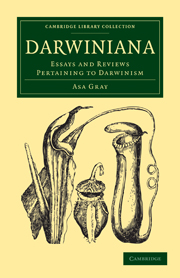Book contents
- Frontmatter
- PREFACE
- Contents
- ARTICLE I THE ORIGIN OF SPECIES BY MEANS OF NATURAL SELECTION
- ARTICLE II DESIGN versus NECESSITY—A DISCUSSION
- ARTICLE III NATURAL SELECTION NOT INCONSISTENT WITH NATURAL THEOLOGY
- ARTICLE IV SPECIES AS TO VARIATION, GEOGRAPHICAL DISTRIBUTION, AND SUCCESSION
- ARTICLE V SEQUOIA AND ITS HISTORY: THE RELATIONS OF NORTH AMERICAN TO NORTH-EASTERN ASIAN AND TO TERTIARY VEGETATION
- ARTICLE VI THE ATTITUDE OF WORKING NATURALISTS TOWARD DARWINISM
- ARTICLE VII EVOLUTION AND THEOLOGY
- ARTICLE VIII “WHAT IS DARWINISM?”
- ARTICLE IX CHARLES DARWIN: SKETCH ACCOMPANYING A PORTRAIT IN “NATURE”
- ARTICLE X INSECTIVOROUS PLANTS
- ARTICLE XI INSECTIVOROUS AND CLIMBING PLANTS
- ARTICLE XII DURATION AND ORIGINATION OF RACE AND SPECIES
- ARTICLE XIII EVOLUTIONARY TELEOLOGY
- INDEX
ARTICLE VIII - “WHAT IS DARWINISM?”
Published online by Cambridge University Press: 05 October 2010
- Frontmatter
- PREFACE
- Contents
- ARTICLE I THE ORIGIN OF SPECIES BY MEANS OF NATURAL SELECTION
- ARTICLE II DESIGN versus NECESSITY—A DISCUSSION
- ARTICLE III NATURAL SELECTION NOT INCONSISTENT WITH NATURAL THEOLOGY
- ARTICLE IV SPECIES AS TO VARIATION, GEOGRAPHICAL DISTRIBUTION, AND SUCCESSION
- ARTICLE V SEQUOIA AND ITS HISTORY: THE RELATIONS OF NORTH AMERICAN TO NORTH-EASTERN ASIAN AND TO TERTIARY VEGETATION
- ARTICLE VI THE ATTITUDE OF WORKING NATURALISTS TOWARD DARWINISM
- ARTICLE VII EVOLUTION AND THEOLOGY
- ARTICLE VIII “WHAT IS DARWINISM?”
- ARTICLE IX CHARLES DARWIN: SKETCH ACCOMPANYING A PORTRAIT IN “NATURE”
- ARTICLE X INSECTIVOROUS PLANTS
- ARTICLE XI INSECTIVOROUS AND CLIMBING PLANTS
- ARTICLE XII DURATION AND ORIGINATION OF RACE AND SPECIES
- ARTICLE XIII EVOLUTIONARY TELEOLOGY
- INDEX
Summary
The question which Dr. Hodge asks he promptly and decisively answers: “What is Darwinism? it is atheism.”
Leaving aside all subsidiary and incidental matters, let us consider—1. What the Darwinian doctrine is, and 2. How it is proved to be atheistic. Dr. Hodge's own statement of it cannot be very much bettered:
“His [Darwin's] work on the ‘Origin of Species’ does not purport to be philosophical. In this aspect it is very different from the cognate works of Mr. Spencer. Darwin does not speculate on the origin of the universe, on the nature of matter or of force. He is simply a naturalist, a careful and laborious observer, skillful in his descriptions, and singularly candid in dealing with the difficulties in the way of his peculiar doctrine. He set before himself a single problem—namely, How are the fauna and flora of our earth to be accounted for? … To account for the existence of matter and life, Mr. Darwin admits a Creator. This is done explicitly and repeatedly. … He assumes the efficiency of physical causes, showing no disposition to resolve them into mind-force or into the efficiency of the First Cause. … He assumes, also, the existence of life in the form of one or more primordial germs. […]
- Type
- Chapter
- Information
- DarwinianaEssays and Reviews Pertaining to Darwinism, pp. 266 - 282Publisher: Cambridge University PressPrint publication year: 2009First published in: 1876



